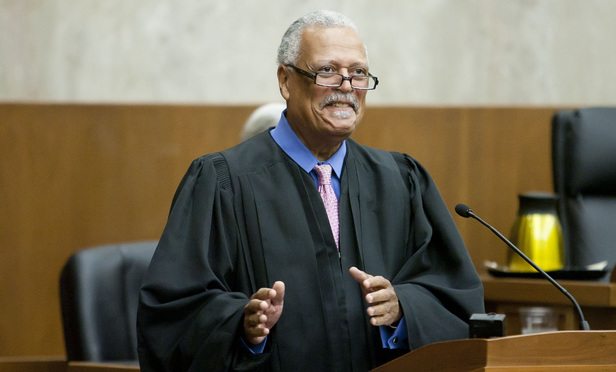
All eyes were on Federal Judge Emmet G. Sullivan as he presided over the December 18, 2018, sentencing of former National Security Adviser and retired Lieutenant General Michael Flynn.
During Flynn’s sentencing on December 18, Sullivan appeared to question whether the charges against the retired Army lieutenant general and President Trump’s first national security adviser went far enough. Sullivan asked prosecutors whether treason had been considered as a charge, to which they said it had not, and the judge told Flynn, “arguably you sold your country out,” warning him he could send him to jail. Sullivan eventually allowed Flynn to delay the sentencing while he continues to cooperate with the government. A status hearing is now scheduled for March. Sentencing guidelines call for Flynn to receive from zero to six months in prison for lying to the FBI, and prosecutors agreed with the recommendation from Flynn’s attorneys that he serve no time behind bars.
Sullivan chastised Flynn one day after two of Flynn’s former business associates were indicted on federal charges accusing them of conspiring to cover up lobbying work they did for Turkey while working with Flynn’s company. Flynn was not charged in that case and cooperated with the government in relation to that investigation as part of his plea deal.
“All along, you were an unregistered agent of a foreign country while serving as the national security advisor to the president of the United States,” Sullivan told Flynn, according to NBC News. “That undermines everything this flag over here stands for. Arguably you sold your country out. I cannot assure you that if you proceed today, you will not receive a sentence of incarceration. This is a very serious offense. A high ranking senior official of the government making false statements to the Federal Bureau of Investigation while in the White House. Very serious crime. “I’m not hiding my disgust, my disdain.”
“If you want to postpone this, and come back at some later point … that’s fine with me,” Sullivan told Flynn, according to CNBC. “I have to caution you that the sentence imposed today may not be the same sentence you would get after cooperation ends. The court likes to be in a position to say there is nothing else this defendant can to do help the United States of America.” Sullivan told lawyers from both sides that he has “many, many, many, more questions,” about the case.
Sullivan told the court, “I wasn’t suggesting he was committing treason. I was just curious if he could have been charged. Lots of conspiracy theories out there. Not taking any uncalled offenses into consideration. Was trying to consider benefit. I’m not suggesting treason.”
The judge is perhaps best known for throwing out the conviction in another politicized case – against former Alaska Senator Ted Stevens, a Republican – in the wake of prosecutorial misconduct accusations. The judge raised eyebrows when, shortly before the Flynn sentencing, he ordered the FBI to turn over memos documenting its interview with Flynn, who was to be sentenced for lying to investigators in that interview. Flynn’s lawyers have said he was not told he could get an attorney in that interview.
That has some people wondering about Judge Emmet Sullivan’s politics. Was he appointed by a Republican or a Democrat? It turns out that he was appointed to judicial positions by both, making him an even more interesting figure.
Here’s what you need to know about Sullivan’s politics:
1. Emmet G. Sullivan Was Named to Judicial Posts by Presidents From Both Parties
Emmet Sullivan has been named to judicial positions by three presidents: Bill Clinton. George H.W. Bush. Ronald Reagan. Two Republicans, and one Democrat.
Emmet Sullivan was named to his current position on the federal bench by former President Bill Clinton.
Writing in the Observer, former prosecutor Sidney Powell, wrote of Sullivan, “An experienced trial judge, Sullivan was a distinguished man and widely held in high regard. He was no ordinary federal judge; he had worked hard all his life on several different courts and had been appointed by three presidents representing both political parties. . . . He had great respect for the rule of law and strived to apply it equally and fairly in all cases in his courtroom.”
According to Ballotpedia, “Sullivan was nominated by President Bill Clinton to the United States District Court for the District of Columbia on March 22, 1994, to a seat vacated by Louis Oberdorfer.” Ballotpedia lists former Vice President Joe Biden, then a U.S. Senator, as being among Sullivan’s supporters at that time.
According to Judge Sullivan’s federal judicial bio, though, the judge was “confirmed by the Senate on June 15, 1994, and received commission on June 16, 1994.” He also served as a Judge, Superior Court of the District of Columbia, 1984-1992, and as a Judge, District of Columbia Court of Appeals, 1992-1994.
However, Sullivan was also appointed to the bench previously by Ronald Reagan. “On October 3, 1984, Judge Sullivan was appointed by President Ronald Reagan to serve as an Associate Judge of the Superior Court of the District of Columbia,” his court bio reads.
“As an Associate Judge of the Superior Court, Judge Sullivan was one of only seven judges in the twenty-four year history of that court to have served full-time in every division. He served as the Deputy Presiding Judge and Presiding Judge of the Probate and Tax Divisions, as well as chairperson of the Rules Committee for those divisions.”
In addition, according to the bio, on November 25, 1991, Judge Sullivan “was appointed by President George H. W. Bush to serve as an Associate Judge of the District of Columbia Court of Appeals. While an Associate Judge of that court, and in addition to his full-time case management responsibilities, Judge Sullivan was Chairperson for the Nineteenth Annual Judicial Conference of the District of Columbia, which was held in 1994.”
The judge’s full name is Emmet G. Sullivan, and he was born in 1947 in Washington, D.C. “Judge Emmet G. Sullivan was born in Washington, D.C., and attended public schools in the District of Columbia until his graduation from McKinley High School in 1964,” his judicial biography reads. “In 1968, he received a Bachelor of Arts Degree in Political Science from Howard University and, in 1971, a Juris Doctor Degree from the Howard University School of Law. Upon graduation from law school, Judge Sullivan was the recipient of a Reginald Heber Smith Fellowship.”
Sullivan Tossed the Public Corruption Conviction Against Former Senator Ted Stevens
Sullivan has railed against prosecutors before and, in one high profile case, he threw out the conviction.
In 2009, the judge expressed outrage at prosecutors’ handling of the corruption case against former Alaska Republican Sen. Ted Stevens. “In nearly 25 years on the bench,” Judge Sullivan said, according to Washington Lawyer, “I’ve never seen anything approaching the mishandling and misconduct that I’ve seen in this case.”
Prosecutors were accused of not handing over exculpatory evidence to the defense. Stevens had been convicted of federal crimes for “failing to report thousands of dollars in gifts he received from friends,” Washington Lawyer reports. Sullivan threw out Stevens’ conviction, but it was at the request of then Attorney General Eric Holder. According to Washington Lawyer, there were allegations of prosecutorial misconduct, and the judge even asked a law firm to investigate the prosecution for possible criminal contempt.
In that case, a key witness had made statements helpful to Stevens but they were not initially disclosed to the defense. They were contained in FBI memos. Law Professor Jonathan Turley, told Washington Lawyer of Emmet G. Sullivan: “He is smart and courteous and even-keeled. To get Judge Sullivan that irate, it takes monumental misconduct.”
In 2017, Sullivan wrote an op-ed in The Wall Street Journal that was titled, “How New York Courts Are Keeping Prosecutors in Line. Evidence that supports the accused is supposed to be turned over to the defense. Ted Stevens would know.”
He raised concerns about prosecutors who “deliberately ignore” rulings that say they need to turn over potentially exculpatory evidence to the defense.
In August 2018, Sullivan made an unusual order in a case in which the Trump administration deported “an immigrant mother and daughter who are plaintiffs in the lawsuit the judge was hearing over asylum restrictions,” according to NBC News.
The judge then ordered the government to turn the plane around and bring both plaintiffs back to the United States, NBC reported. If they didn’t, Sullivan said he might bring top officials – such as the Homeland Security Secretary and Attorney General – into court to answer to potential contempt of court accusations.
As for Flynn, you can read the redacted FBI memo the judge wanted released here:
Flynn was interviewed by Peter Strzok, the FBI agent who later became the focal point of controversy when his texts with an FBI lawyer trashing President Donald Trump and Republicans came to light.
